

mailto: payer@payer.de
Zitierweise / cite as:
Payer, Margarete <1942 - >: Informationsmarktverzerrung durch Fundamentalismus am Beispiel der USA. -- Kapitel 7: Was hat Gott mit den USA vor? -- Fassung vom 2005-06-30. -- URL: http://www.payer.de/fundamentalismus/fundamentalismus07.htm
Erstmals publiziert: 2005-04-19
Überarbeitungen: 2005-06-30 [Ergänzungen]; 2005-04-20 [Ergänzungen]
Anlass: Lehrveranstaltung an der Hochschule der Medien Stuttgart, Sommersemester 2005
Copyright: Dieser Text steht der Allgemeinheit zur Verfügung. Eine Verwertung in Publikationen, die über übliche Zitate hinausgeht, bedarf der ausdrücklichen Genehmigung des Verfassers.

Diese Inhalt ist unter einer Creative Commons-Lizenz lizenziert.
Dieser Text ist Teil der Abteilung Länder und Kulturen von Tüpfli's Global Village Library
| "Uncle Sam, with all his might, will be no match for
Antichrist." Der Herausgeber des Christian Digest, 1942 |
[Zitiert in: Boyer, Paul <1935 - >: When time shall be no more : prophecy belief in modern American culture. -- Cambridge, Mass. : Belknap Press of Harvard University Press, 1992. -- xiv, 468 S., [16] p. of plates : Ill., map ; 25 cm. -- ISBN: 067495128X. -- S. 225. -- {Wenn Sie HIER klicken, können Sie dieses Buch bei amazon.de bestellen}]
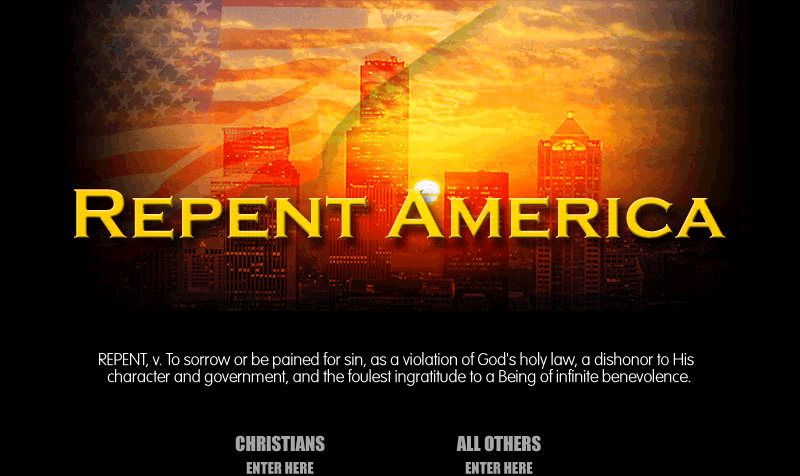
Abb.: Repent America — Amerika, tu Buße
[Bildquelle: ©http://www.repentamerica.com/. -- Zugriff am 2005-03-24]

Abb.: God hates America
[Bildquelle:
http://www.godhatesamerica.com/. -- Zugriff am 2005-06-309
|
The King's Business
I am a stranger here, within a
foreign land;
This is the King’s command: that all men, everywhere,
My home is brighter far than Sharon’s rosy plain,
|
| Text: Elijah Taylor Cassel (1849-1930), 1902 Melodie: Flora Hamilton Cassel (1852-1911) |
[Quelle: der midi-Datei: http://www.cyberhymnal.org/htm/k/i/kingsbus.htm. -- Zugriff am 2005-04-01]
| "I want you to just let a wave of intolerance wash over you. I want you to
let a wave of hatred wash over you. Yes, hate is good...Our goal is a Christian
nation. We have a Biblical duty, we are called by God, to conquer this country.
We don't want equal time. We don't want pluralism." Randall Terry,1993 |
| "When the Christian majority takes over this country, there will be no
satanic churches, no more free distribution of pornography, no more abortion on
demand and no more talk of rights for homosexuals. After the Christian majority
takes control, pluralism will be seen as immoral and evil and the state will not
permit anybody to practice it." Pat Robertson, 1988 |
| "We have allowed rampant secularism and occult, etc., to be
broadcast on television. We have permitted somewhere in the
neighborhood of 35 to 40 million unborn babies to be slaughtered in
our society. We have a court that has essentially stuck its finger
in God's eye and said we're going to legislate you out of the
schools. We're going to take your commandments from off the
courthouse steps in various states. We're not going to let little
children read the commandments of God. We're not going to let the
Bible be read, no prayer in our schools. We have insulted God at the
highest levels of our government. And then we say, 'why does this
happen?' It is happening because God Almighty is lifting His
protection from us." Jerry Falwell, 2 Tage nach dem 11. September 2001 |
[Zitiert in: The fundamentals of extremism : the Christian right in America / edited by Kimberly Blaker. -- New Boston, Mich. : New Boston Books, ©2003. -- 287 S. ; 22 cm. -- ISBN: 0972549617. -- S. 25, 179, 182f.. -- {Wenn Sie HIER klicken, können Sie dieses Buch bei amazon.de bestellen}]
| "We don't have to protect the environment, the Second Coming
is at hand." James Watt (Secretary of the Interior under Reagan) |
[Zitiert in: http://www.gainesvillehumanists.org/quotes.htm. -- Zugriff am 2005-04-06]
Auf der einen Seite ist das amerikanische Christentum verständlicherweise - viele Gläubige durften erst in Amerika nach ihrer eigenen Fasson selig werden - von einem starken Patriotismus und Sendungsbewusstsein geprägt (God's own country), wie er in folgendem Lied zum Ausdruck kommt:
|
O beautiful for spacious skies,
For amber waves of grain; For purple mountain majesties Above the fruited plain! America! America! God shed His grace on thee, And crown thy good with brotherhood, From sea to shining sea. O beautiful for heroes proved O beautiful for patriot dream |
| Text: Katherine Lee Bates (1859 - 1929), 1904 Melodie: Samuel Augustus Ward (1847 - 1903), 1882 |
[Quelle der midi-Datei: http://www.cyberhymnal.org/htm/o/b/obfsskis.htm. -- Zugriff am 2005-04-01]
Oder im Spiritual: "We are Americans, Praise the Lord"

Aufnahme aus den 1940er Jahren, Interpreten Houston Congregati
Quelle der mp3-Datei:
http://www.fccwilli.org/. -- Zugriff am 2005-04-20
Man konnte auch den amerikanischen Bürgerkrieg als heiligen Krieg sehen:
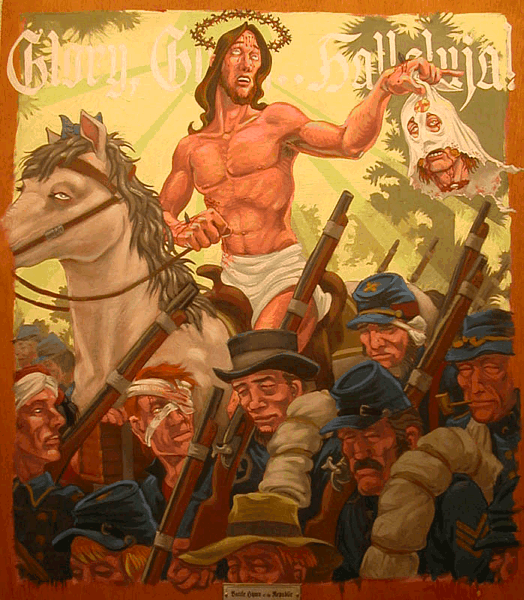
Abb.: Battle Hymn of the Republic / von ©Van Arno
[Bildquelle:
http://skeletonart.com/Detailed/325.html. -- Zugriff am 2005-04-01]
|
Battle Hymn of the Republic
Mine eyes have seen the
glory of the coming of the Lord; I have seen Him in the watch fires of a hundred circling
camps I have read a fiery Gospel writ in burnished rows of
steel; He has sounded forth the trumpet that shall never call
retreat; In the beauty of the lilies Christ was born across the
sea, He is coming like the glory of the morning on the wave, |
| Text: Julia Ward Howe (1819-1910), 1861 Melodie: 19 Jhdt camp meeting Melodie |
""This hymn was born during the American civil war, when Howe visited a Union Army camp on the Potomac River near Washington, D. C. She heard the soldiers singing the song “John Brown’s Body,” and was taken with the strong marching beat. She wrote the words the next day."
[Quelle der midi-Datei: http://www.cyberhymnal.org/htm/b/h/bhymnotr.htm. -- Zugriff am 2005-04-01]
Dieselbe Haltung drücken auch folgende Zitate aus:
"We Americans are the peculiar, chosen people — the Israel of our time; we bear the ark of the liberties of the world ... We are the pioneers of the world: the advance guard, sent on through the wilderness of untried things, to break a new path in the New World, that is ours."
Herman Melville, White ticket, 1850."America was intended to be a spirit among the nations of the world."
Woodrow Wilson, Address, July 13, 1916."America has more God-fearing citizens per capita than any other nation on earth. There are millions of Americans who love God, decency and biblical morality. North America is the last logical base for world evangelization. While it is true that God could use any nation or means possible to spread the Gospel to the world, it is also true that we have the churches, the schools, the young people, the media, the money, and the means of spreading the Gospel worldwide in our lifetime."
Jerry Falwell, Listen America! New York: Doubleday, 1980.[Alle Zitate in: Mojtabai, A. G. (Ann Grace) <1937 - : Blessèd assurance : at home with the bomb in Amarillo, Texas. -- 1st Syracuse University Press ed. -- Syracuse, N.Y. : Syracuse University Press, 1997. -- xvi, 255 S. ; 21 cm. -- ISBN: 0815605080. -- Originally published: Boston : Houghton Mifflin, 1986. -- S. 126f. -- {Wenn Sie HIER klicken, können Sie dieses Buch bei amazon.de bestellen}]
Andererseits führt die endzeitliche Sicht der Geschichte dazu, dass Fundamentalisten vor allem die "Verfallserscheinungen" sehen und auch die zukünftige Bedeutung der USA eher abwerten. So dieses Buch des fundamentalistischen Bestsellerautors Dave Wilkerson
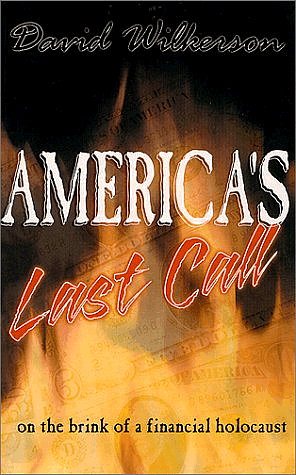
Wilkerson, David, R.: America's last call : on the brink of a financial holocaust. -- Lindale, Tex. : Wilkerson Trust Publications, ©1998. -- 141 s. ; 21 cm. -- ISBN 0966317211. -- {Wenn Sie HIER klicken, können Sie dieses Buch bei amazon.de bestellen}
"The American dream is going to turn into the American nightmare. It will occur suddenly--without warning--and no one will be able to explain how or why it happened. There will be seller only--no buyers. A majority of Americans have concluded, "Morals do not count. Let our leaders do as they please; just give us a booming economy. Let the good times roll. All that matters is prosperity!" God is about to cursh this abominable American mindset. And like the prophet Jeremiah, those who believe in the holy, righteous judgments of god will say that the Lord has fulfilled what He established long ago. "
Inhaltsverzeichnis:
Introduction
America's Last Call
The Crippling of the American Economy
America Has Crossed the Line
Payday for the Shedding of the Blood of the Innocents
The Ominous Rise of Militant Homosexual Power
The Prophets Have Warned Us
Historical Warnings: The Destruction of London
Misreading the Times
Perfect Peace in a Time of Panic
Knowing God's Voice: The Secret to Surviving the Coming Crash
Am 22. Februar 1857 (George Washingtons Geburtstag) hielt Fountain Pitts, ein methodistischer Geistlicher aus Tennessee, im U.S.-Kapitol eine Predigt über Amerikas prophetische Bestimmung. Die Predigt dauerte den ganzen Tag. Unter Anderem fand Pitt im Buch Daniel auch die Unabhängigkeitserklärung der USA vorausgesagt:
"The United States arose at the end of 1290 symbolic days from the destruction of Jerusalem; . . . Daniel's 70 weeks being equal to 603 years and 129 days of solar time, according to the eclipses of the sun . . . , so that if 70 symbolic weeks equaled 600 years and 129 days, 1290 symbolic days reached from the burning of the temple on the 189th day of the year 68 a.d. to the 4th of July, 1776 . . . Making the starting-point at the occasion of the daily sacrifice, which happened, according to astronomy, at sunrise, three minutes past five o'clock a.m. on the day the temple was burnt, the 1290 days run out at a quarter to three o'clock p.m., on the 4th day of July, 1776; and, from the best sources of information, the Declaration of Independence was proclaimed at that hour on the glorious Fourth." [Zitiert in: Boyer, Paul <1935 - >: When time shall be no more : prophecy belief in modern American culture. -- Cambridge, Mass. : Belknap Press of Harvard University Press, 1992. -- xiv, 468 S., [16] p. of plates : Ill., map ; 25 cm. -- ISBN: 067495128X. -- S. 85. -- {Wenn Sie HIER klicken, können Sie dieses Buch bei amazon.de bestellen}]
Jesaja 18
1Weh dem Lande, das unter den Segeln im Schatten fährt, jenseits der Wasser des Mohrenlandes,
2das Botschafter auf dem Meer sendet und in Rohrschiffen auf den Wassern fährt! Gehet hin, ihr schnellen Boten, zum Volk, das hochgewachsen und glatt ist, zum Volk, das schrecklicher ist denn sonst irgend eins, zum Volk, das gebeut und zertritt, welchem die Wasserströme sein Land einnehmen.
[Luther-Bibel 1912]
"The following is a translation of Isaiah 18:1-2, based on three highly recognized authorities of Biblical Hebrew. 1. Alas oh land [United States] shadowed by wings, which is beyond the river of Ethiopia. 2. That sends heralds, even as books of paper, across large bodies of water, …saying [by it’s favorable laws and Christian preference], Go, you swift messengers, to a nation scattered or dragged and polished by scouring, to a people reverent from their beginning hitherto; a nation measured and trodden down, whose land the river has cut off.
Vs. 1 refers to a “land” or nation under the shadow of wings located “beyond the river of Ethiopia,” or beyond the known world of ancient Bible times. It was a small world back then–Southeastern Europe, Asia Minor, Egypt, and Ethiopia. Beyond that, little was known. Vs. 2 locates this nation beyond a great “body of water.” This is true of the US.
The phase “a nation shadowed [or protected] by wings” certainly is true of the US. The affairs of our nation have been divinely overruled for Christians. Since its founding, the religiously and politically oppressed have been welcomed. Christianity has thrived in this haven of divine providence.
Vs. 2 tells us something additional about the US. From its shores, “messengers” in the form of “printed books” “herald” the Gospel to a “nation.” Who is this nation? Remember 1Peter 2:9 designates the church as the “holy nation.” Isaiah shows this [holy] “nation” or Church is “dragged” or “scattered” around the world and “polished,” that is, made noble by the “scouring” of the Word of truth. Indeed, the Church “reverent from its beginning” endured “trodden down” experiences as “meted or measured out” by the Lord for their character development.
From God’s standpoint, the US is not perfect. Yet it has been a blessed haven of liberty and prosperity for Christians so that they could herald the Truths of God’s Word over the seas and around the world. But times are changing. Since the US became the “lone superpower of the world,” the corroding effects of pride have become evident. This is why Isaiah begins the prophecy with a Hebrew word that can be translated “Woe,” pronouncing calamity. But according to Gesenius (noted Hebrew lexicographer) it sometimes, and probably here, means an exclamation with a touch of pity—alas. The prophet is saddened. The Church, the antitypical Isaiah, is saddened as we see the accumulation of shortcomings tarnishing “America the Beautiful” whom we highly esteem."
[Quelle: http://www.bible411.com/newsletters/nb200401.htm. -- Zugriff am 2005-03-24]
2. Brief des Paulus an Timotheus 3
1Das sollst du aber wissen, dass in den letzten Tagen werden greuliche Zeiten kommen.
2Denn es werden Menschen sein, die viel von sich halten, geizig, ruhmredig, hoffärtig, Lästerer, den Eltern ungehorsam, undankbar, ungeistlich,
3lieblos, unversöhnlich, Verleumder, unkeusch, wild, ungütig,
4Verräter, Frevler, aufgeblasen, die mehr lieben Wollust denn Gott,
5die da haben den Schein eines gottseligen Wesens, aber seine Kraft verleugnen sie; und solche meide.
6Aus denselben sind, die hin und her in die Häuser schleichen und führen die Weiblein gefangen, die mit Sünden beladen sind und von mancherlei Lüsten umgetrieben,
7lernen immerdar, und können nimmer zur Erkenntnis kommen.
8Gleicherweise aber, wie Jannes und Jambres dem Mose widerstanden, also widerstehen auch diese der Wahrheit; es sind Menschen von zerrütteten Sinnen, untüchtig zum Glauben.
9Aber sie werden's in die Länge nicht treiben; denn ihre Torheit wird offenbar werden jedermann, gleichwie auch jener Torheit offenbar ward.
10Du aber bist nachgefolgt meiner Lehre, meiner Weise, meiner Meinung, meinem Glauben, meiner Langmut, meiner Liebe, meiner Geduld,
11meinen Verfolgungen, meinen Leiden, welche mir widerfahren sind zu Antiochien, zu Ikonien, zu Lystra. Welche Verfolgungen ich da ertrug! Und aus allen hat mich der HERR erlöst.
12Und alle, die gottselig leben wollen in Christo Jesu, müssen Verfolgung leiden.
13Mit den bösen Menschen aber und verführerischen wird's je länger, je ärger: sie verführen und werden verführt.
14Du aber bleibe in dem, was du gelernt hast und dir vertrauet ist, sintemal du weißt, von wem du gelernt hast.
15Und weil du von Kind auf die heilige Schrift weißt, kann dich dieselbe unterweisen zur Seligkeit durch den Glauben an Christum Jesum.
16Denn alle Schrift, von Gott eingegeben, ist nütze zur Lehre, zur Strafe, zur Besserung, zur Züchtigung in der Gerechtigkeit,
17daß ein Mensch Gottes sei vollkommen, zu allem guten Werk geschickt.[Luther-Bibel 1912]
Jakobusbrief 5
1Wohlan nun, ihr Reichen, weinet und heulet über euer Elend, das über euch kommen wird!
2Euer Reichtum ist verfault, eure Kleider sind mottenfräßig geworden.
3Euer Gold und Silber ist verrostet, und sein Rost wird euch zum Zeugnis sein und wird euer Fleisch fressen wie ein Feuer. Ihr habt euch Schätze gesammelt in den letzten Tagen.
4Siehe, der Arbeiter Lohn, die euer Land eingeerntet haben, der von euch abgebrochen ist, der schreit, und das Rufen der Ernter ist gekommen vor die Ohren des HERRN Zebaoth.
5Ihr habt wohlgelebt auf Erden und eure Wollust gehabt und eure Herzen geweidet am Schlachttag.
6Ihr habt verurteilt den Gerechten und getötet, und er hat euch nicht widerstanden.
7So seid nun geduldig, liebe Brüder, bis auf die Zukunft des HERRN. Siehe, ein Ackermann wartet auf die köstliche Frucht der Erde und ist geduldig darüber, bis er empfange den Frühregen und den Spätregen.
8Seid ihr auch geduldig und stärket eure Herzen; denn die Zukunft des HERRN ist nahe.[Luther-Bibel 1912]
"Where is the United States in Bible Prophecy? One of the most common questions regarding Bible prophecy is where is the United States in scripture? Many nations of the world are not mentioned in scripture, however it is hard to understand how the world's most powerful nation would not be. At least not in a way that we recognize it clearly.
Their are many theories and ideas as to why this is but here are three of the most common:
- The United States is no longer relevant
- The United States is destroyed
- The United States is no longer its own country - but part of a larger union of nations - possibly controlled by the Antichrist.
All of these responses are based on speculation. We simply do not know the answer but it is very possible there may be some symbolism that the United States may fit into. We must simply watch and wait to see what God's plan for America is.
To that effect we monitor what impact terrorism and war might have on the United States as well any other factors that could contribute to its decline or change on the world stage.
America is also Israel's closest ally. God promises to bless those who bless Israel and curse those who curse Israel (Genesis 12:3). America's relationship with Israel will be closely watched."
[Quelle: http://www.prophecynewswatch.com/usa.html. -- Zugriff am 2005-03-23]
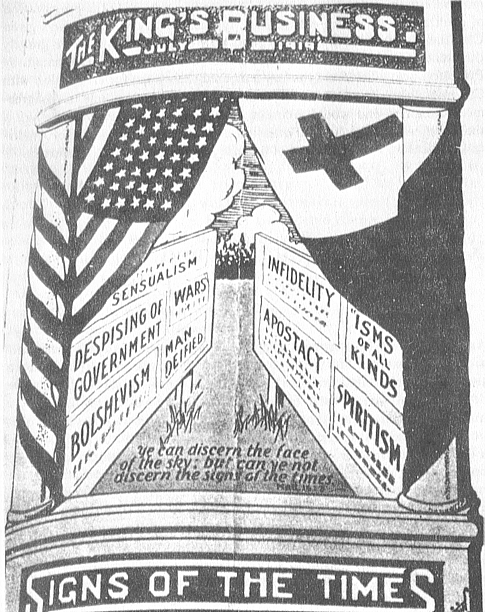
Abb.: Signs of the times. -- In: King's Business. -- 1918-07
[Bildquelle von "Important election": Marsden, George M. <1939 - >: Fundamentalism and American culture : the shaping of twentieth century evangelicalism, 1870-1925. -- New York : Oxford University Press, 1980. -- xiv, 306 S. : Ill. ; 24 cm. -- ISBN 0195027582. -- S. 154. -- {Wenn Sie HIER klicken, können Sie dieses Buch bei amazon.de bestellen}]
Immer wiederkehrend werden folgende "Übel" der amerikanischen Gesellschaft genannt, die Zeichen des endzeitlichen Niedergangs der USA sind:

Abb.: Christliche Homophobie
[Bildquelle:
http://www.truluck.com/html/dynamics_of_sick_religion.html. -- Zugriff
am 2005-03-26]

Abb.: Christliche Homophobie
[Bildquelle:
http://www.attitudetees.com/items/adamandeve.html. -- Zugriff am
2005-04-07]

Abb.: Fag USA
[Bildquelle:
http://www.godhatesamerica.com/html/91101.html. -- Zugriff am
2005-06-30]
| God Hates America (Sung to God Bless America)
[Quelle: http://www.godhatesamerica.com/pdf/lyrics/godhatesamerica.pdf. -- Zugriff am 2005-06-30]
|
| "America The Burning (to the tune of America the Beautiful) O wicked land of sodomites Your World Trade Center's gone With crashing planes and burning flames To hell their souls have flown
O wicked land of sodomites
O wicked land of sodomites
O wicked land of sodomites
O wicked land of sodomites
O wicked land of sodomites
[Quelle: http://www.godhatesamerica.com/pdf/lyrics/americatheburning.pdf. -- Zugriff am 2005-06-30] Quelle der mp3-Datei: http://www.godhatesamerica.com/sound/americatheburning.mp3. -- Zugriff am 2005-06-30 |
So bekommt AIDS Sinn:
| "Revelation 8:7 says one judgment alone—of the many, many
judgments seen in Revelation—will destroy one third of the earth.
Certainly God's criterion for unleashing His wrath will be to punish
those peoples who have rejected the most light. Up until now, what has protected America is:
Since the End of the Age is coming on us as birth pangs according
to the words of Yeshua [Hebrew for Jesus], then it is quite logical
to see the beginning pangs sometime before the "birth" has actually
taken place... "Christ for the nations. -- Zitiert in: Diamond, Sara: Spiritual warfare : the politics of the Christian right. -- Boston, MA : South End Press, ©1989. -- 292 S. -- ISBN 0896083616. -- S. 133] |
Besonders schlimm ist die gleichgeschlechtliche Ehe:
"Homosexual living arrangements under the guise of marriage are not only sterile, incapable, and insufficient, they are destructive to the very fabric of our society. The strategy to inculturate active homosexual practice into our society as a favored institution is synonymous with injecting a cancer into a healthy body. Homosexual marriage directly attacks the family which is the most vital cell in society. The family is the first government, the first church, and the first school. We must not allow this vital cell, the rock upon which society is built, to be inculturated with a perversion that will destroy it, and with it the future of our children and grandchildren." [Keith Fournier, 1997. -- Zitiert in: Diamond, Sara: Not by politics alone : the enduring influence of the Christian Right. -- New York : Guilford Press, ©1998. -- xiv, 280 S. ; 23 cm. -- ISBN 1572303859. -- S. 171. -- {Wenn Sie HIER klicken, können Sie dieses Buch bei amazon.de bestellen}]
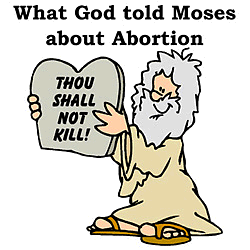
Abb.: T-Shirt-Aufdruck
[Bidlquelle: ©http://www.christianshirts.net/prolife2.php.
-- Zuriff am 2005-03-26]
| "Such leaders need to be returned to office and joined by others who share
their moral persuasion. Only then will we halt the tragic breakdown that finds
us murdering, by abortion, more babies every four years than Adolf Hitler killed
in World War II." [Tim LaHaye, 1979. -- Zitiert in: Diamond, Sara: Spiritual warfare : the politics of the Christian right. -- Boston, MA : South End Press, ©1989. -- 292 S. -- ISBN 0896083616. -- S. 85] |

Abb.: "Blasphemisch": Twisted Sister: Stay hungry, enthält u.a. "Burn
in Hell"
{Wenn Sie
HIER klicken, können Sie diese CD bei amazon.de
bestellen, dort auch Hörpoben!}

Abb.: Entspricht das etwa dem 1. Brief des Paulus an die Korinther 11,3:
"Ich lasse euch aber wissen, dass Christus ist eines jeglichen Mannes Haupt;
der Mann aber ist des Weibes Haupt; Gott aber ist Christi Haupt."
| "The feminist agenda is not about equal rights for women. It is
about a socialist, anti-family political movement that encourages
women to leave their husbands, kill their children, practice
witchcraft, destroy capitalism and become lesbians." [Pat Robertson, 1992. -- Zitiert in: The fundamentals of extremism : the Christian right in America / edited by Kimberly Blaker. -- New Boston, Mich. : New Boston Books, ©2003. -- 287 S. ; 22 cm. -- ISBN: 0972549617. -- S. 70. -- {Wenn Sie HIER klicken, können Sie dieses Buch bei amazon.de bestellen}] |

Abb.: Ist das der Jesus der Bibel?
[Bildquelle:
http://www.holyspiritinteractive.net/features/newage/cancer01_yoga.asp.
-- Zugriff am 2005-03-26]

Abb.: So wär's richtig!
[Bildquelle:
http://www.daniellesplace.com/homeschool/index.cfm. -- Zugriff am
2005-03-26]
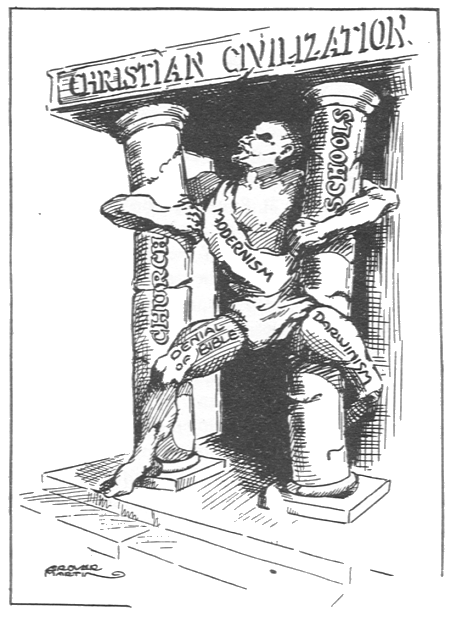
Abb.: Modernismus, Darwinismus, Bibelleugnung zersören die Stützen der
christlichen Zivilisation, Kirche und Schule. -- In: The King's Business. --
1922-07. -- S. 642
[Bildquelle : Marsden, George M. <1939 - >:
Fundamentalism and American culture : the shaping of twentieth century
evangelicalism, 1870-1925. -- New York : Oxford University Press, 1980. --
xiv, 306 S. : Ill. ; 24 cm. -- ISBN 0195027582. -- S. 163. -- {Wenn Sie
HIER klicken, können Sie dieses Buch bei
amazon.de
bestellen}]
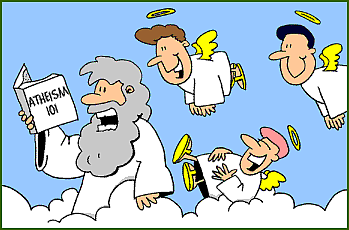
Abb.: Atheismus ist für Gott ja zum Lachen
[Bildquelle:
http://www.abcsoffaith.com/html/gh.html. -- Zugriff am 2005-03-26]
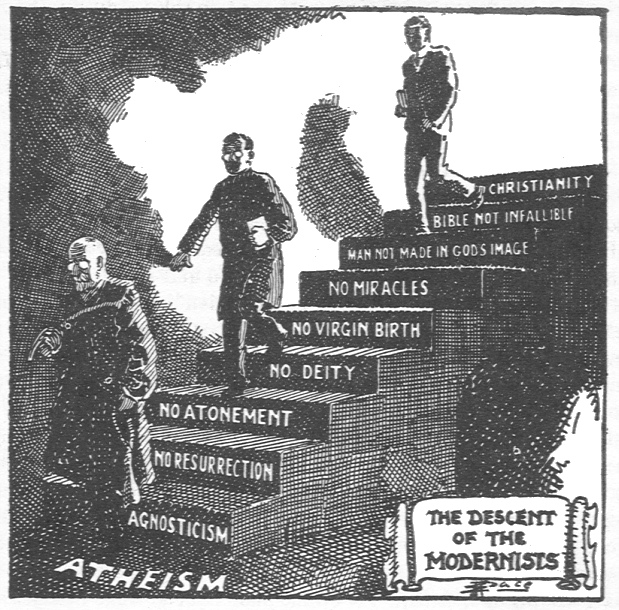
Abb.: Christlicher Modernismus als Weg zum Atheismus: The descent of the
modernists. -- In: Bryan, William
Jennings: Seven questions in dispute. -- New York, 1924
[Bildquelle : Marsden, George M. <1939 - >:
Fundamentalism and American culture : the shaping of twentieth century
evangelicalism, 1870-1925. -- New York : Oxford University Press, 1980. --
xiv, 306 S. : Ill. ; 24 cm. -- ISBN 0195027582. -- S. 173. -- {Wenn Sie
HIER klicken, können Sie dieses Buch bei
amazon.de
bestellen}]
| "Simply defined, humanism is man's [sic] attempt to solve his
problems independently of God. Since moral conditions have become
worse and worse in direct proportion to humanism's influence, which
has moved our country from a biblically based society to an amoral "democratic"
society during the past forty years, one would think that humanists
would realize the futility of their position. To the contrary, they
treacherously refuse to face the reality of their failures, blaming
them instead on traditional religion or ignorance or capitalism or
religious superstitions." [Tim LaHaye, 1979. -- Zitiert in: Diamond, Sara: Spiritual warfare : the politics of the Christian right. -- Boston, MA : South End Press, ©1989. -- 292 S. -- ISBN 0896083616. -- S. 85] |
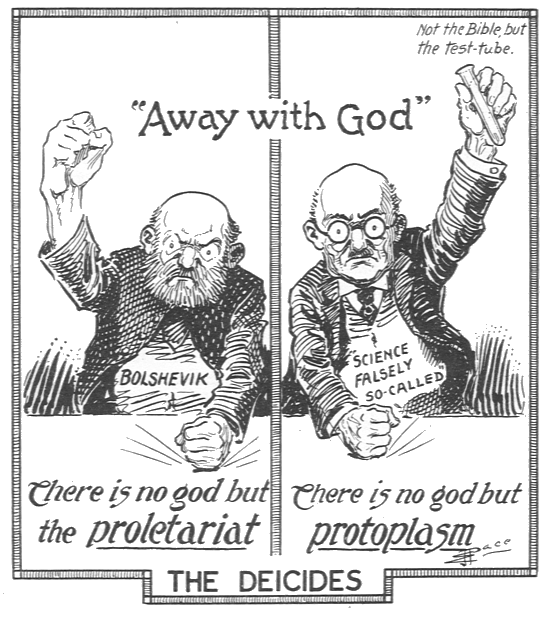
Abb.: The deicides — die Gottesmörder. -- In: The
King's Business. -- 1925-05. -- S. 197
[Bildquelle : Marsden, George M. <1939 - >: Fundamentalism and American culture : the shaping of twentieth century evangelicalism, 1870-1925. -- New York : Oxford University Press, 1980. -- xiv, 306 S. : Ill. ; 24 cm. -- ISBN 0195027582. -- S. 209. -- {Wenn Sie HIER klicken, können Sie dieses Buch bei amazon.de bestellen}]
Siehe z.B. folgendes Nachtgesicht von David Wikerson 1985:
"God is going to judge America for its violence, its crimes, its backslidings, its murdering of millions of babies, its flaunting of homosexuality and sadomasochism, its corruption, its drunkenness and drug abuse, its form of godliness without power, its lukewarmness toward Christ, its rampant divorce and adultery, its lewd pornography, its child molestation, its cheatings, its robbings, its dirty movies, and its occult practices ... . America today is one great holocaust party, with millions drunk, high, shaking their fist at God, daring him to send the bombs." [Zitiert in: Boyer, Paul <1935 - >: When time shall be no more : prophecy belief in modern American culture. -- Cambridge, Mass. : Belknap Press of Harvard University Press, 1992. -- xiv, 468 S., [16] p. of plates : Ill., map ; 25 cm. -- ISBN: 067495128X. -- S. 234. -- {Wenn Sie HIER klicken, können Sie dieses Buch bei amazon.de bestellen}]
Oder die Jeremiade von Martin R. DeHaan (1891 - 1965) über den (typisch amerikanischen) Fortschrittsglauben:
"After centuries and millenniums of our flaunted civilization, and boasting of human progress, with its advance in education and reform, [and] scientific evolution, the heart of man has not been improved one bit ... The more educated a sinner is, the more dangerous he becomes . . . Nowhere in the entire Bible is there a single verse to support the contention that this world will become better and better until at last by the efforts of man in the field of education, science, and the preaching of a watered-down, social "gospel," man will finally learn his lesson and the age will climax in a great worldwide revival, and then wars will be abolished, and the nations live in peace. No! No! My friend, the Bible knows nothing of such a program! Instead the Bible teaches without exception that the world will grow worse and worse." [Zitiert in: Boyer, Paul <1935 - >: When time shall be no more : prophecy belief in modern American culture. -- Cambridge, Mass. : Belknap Press of Harvard University Press, 1992. -- xiv, 468 S., [16] p. of plates : Ill., map ; 25 cm. -- ISBN: 067495128X. -- S. 237f.. -- {Wenn Sie HIER klicken, können Sie dieses Buch bei amazon.de bestellen}]
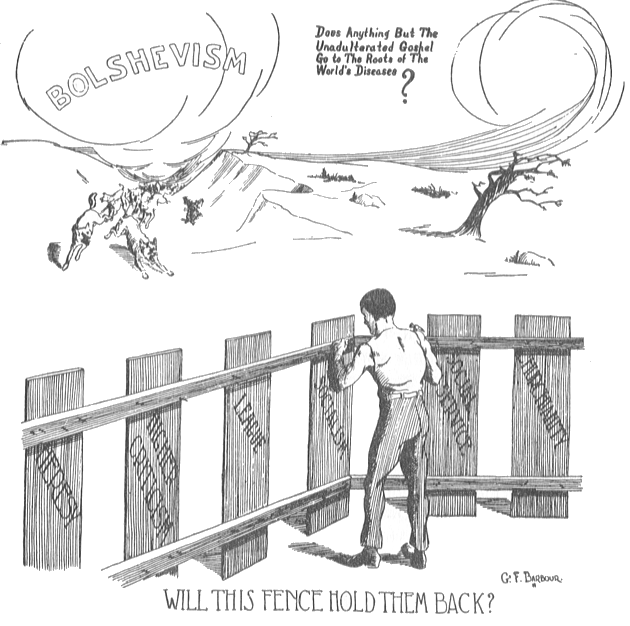
Abb.: Bolschewismus — eine früher gern beschworene
Gefahr: Will this fence hold them back. -- In: King's Business. -- 1919-06. --
S. 588
[Bildquelle von "Important election": Marsden, George M. <1939 - >: Fundamentalism and American culture : the shaping of twentieth century evangelicalism, 1870-1925. -- New York : Oxford University Press, 1980. -- xiv, 306 S. : Ill. ; 24 cm. -- ISBN 0195027582. -- S. 155. -- {Wenn Sie HIER klicken, können Sie dieses Buch bei amazon.de bestellen}]
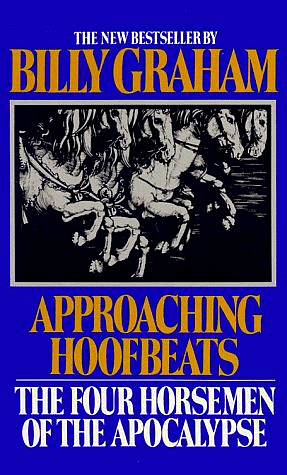
Abb.: Einbandtitel
Graham, Billy <1918 - >: Approaching hoofbeats : the four horsemen of the Apocalypse. -- Waco, Tex. : Word Books, c1983. Description: 236 S. ; 24 cm. -- ISBN 0849903580
Dieses Buch verdient besondere Erwähnung:
"Billy Graham's book Approaching Hoofbeats, although being nearly twenty years old (at the time of this review), is as timely as the day it was first put to paper. The world famous Evangelist studies some of the famous symbols of John's Revelations and how they are more important than ever in today's world and Church. I admit that I approached the book with a bit of unease, the Bible warns against listening to those that interpret omens, and some believe that extends to those who try to second guess the Bible and the timing of prophecy events that Jesus said only God would know, within the context of the fiction arena, as with the Left Behind series or The Omen trilogy, I have no problems - it's fantasy. However my worries soon vanished as Mr. Graham, instead of belting out the cliched 'the end is now', leaves the inevitable to God and instead focuses on how Christians must remain diligent in faith and practice (i.e. really walk the Walk instead of puffing out our collective chests and talking the Walk). The three chapters devoted to the White Horse of Deception, I think, should be required reading for any Christian, both new to the faith or smugly tooling around with those "I'm gonna be raptured" bumper stickers (remember, Pride cometh before the fall!) next to the license plate. His firm stance on promoting peace, giving selflessly to those in need, and remaining true to scripture makes for an invigorating read. Highly recommended. " [Quelle: Chadwick H. Saxelid "Bookworm" (Concord, CA United States). -- Amazon.com]
"In the early 1980s, however, social issues loomed larger in Graham's sermons. In Moscow in 1982, he called the nuclear arms race "a moral and spiritual issue that must concern us all" and offered a five-point disarmament program culminating in a ban on all nuclear, biochemical, and laser weapons. To evangelicals unsettled by this new activist emphasis, he described himself as a man "in process" still exploring "the deeper . . . implications of [his] faith." Graham's Approaching Hoojbeats (1983) offered a fascinating picture of this evolution, as it vacillated between social meliorism and classic premillennial fatalism. The "hoofbeats" of the title were those of the four horses of the Apocalypse, conventionally taken to represent famine, pestilence, war, and death. Discussing each "horse" in the allegorical fashion favored by theological liberals, Graham addressed issues such as Third World poverty, disease, and overpopulation; drought and famine; environmental hazards; and the arms race. Vividly evoking the horrors of modern war, he insisted that one cannot "sit silently by" in the face of the threat; the red horse "rides in warning to effect positive change." Jesus blessed the peacemakers, and Christians must work to slow the arms race and avoid nuclear war. Alone among Cold War premillen-nialists, Graham confessed that he should have done more to address issues of world peace and social justice.
Yet the classic premillennial outlook too shaped Approaching Hoojbeats. History's final movements ("perhaps just ahead"), Graham wrote, will see "nuclear conflagrations, biological holocausts and chemical apocalypses rolling over the earth, bringing man to the edge of the precipice. History will 'bottom out' in the battle of Armageddon." Struggling to resolve the book's eschatological schizophrenia, he argued that while prophecy is sure, God may delay foreordained events in response to human effort. Therefore, we must never lapse into passivity in the face of issues such as the nuclear threat. Still, whatever we do, "ultimate peace" will come only when Christ reigns on earth.
In a nationally televised sermon in 1990, Graham, now in his early seventies, still vacillated between premillennial orthodoxy and his newly awakened social conscience. Addressing the question "Are the Last Days Almost Here?" Graham insisted that they are. "We've become so technological and so wicked at the same time, that we have been on the verge of destroying our world. But . . . God is going to step in and not allow us to have an atomic war." How will God accomplish this purpose? He will "cleanse the earth by fire" just as He "cleansed" it by flood in Noah's day! The implication was not reassuring: like the American troops who burned the Vietnam village in order to save it, God will destroy the earth to prevent wicked mankind from blowing it up. (Or, as one critic of the premillennial nuclear scenario put it, "God so loved the world that he sent it World War HI.")
At the same time, echoes of Graham's flirtation in the early 1980s with social activism survived at least vestigially in this 1990 sermon: the arms race was "a spiritual and moral problem," he declared, and whatever humanity's ultimate destiny, Christians must speak out against it. The confusing message reflected the ambivalence of a man of conscience deeply rooted in one intellectual and theological tradition seeking to accommodate himself to another, very different one. Graham went perhaps as far as one could in adapting premillennialism to an ethic of social engagement with the nuclear threat and other issues of global import."[Quelle: Boyer, Paul <1935 - >: When time shall be no more : prophecy belief in modern American culture. -- Cambridge, Mass. : Belknap Press of Harvard University Press, 1992. -- xiv, 468 S., [16] p. of plates : Ill., map ; 25 cm. -- ISBN: 067495128X. -- 139f. -- {Wenn Sie HIER klicken, können Sie dieses Buch bei amazon.de bestellen}]
"Prosperity Theology Variously known as the prosperity gospel, "name it, claim it," or positive confession theology, prosperity theology posits that God is willing—indeed, eager—to bestow material blessings on the faithful. Although accounts of its origins differ, this doctrine is generally traced to E. W. Kenyon, but it may have its roots in New Thought metaphysical ideas, the notion that anything from health to abundance was available simply through the proper disposition of the mind.
Prosperity theology was taken up by many of the televangelists in the 1970s and 1980s, notably Kenneth Copeland, Kenneth Hagin, Robert Tilton, and Frederick K. C. Price, among others. Not surprisingly, prosperity theology enjoyed its greatest popularity during the 1980s, the Reagan era, with its emphasis on affluence and self-aggrandizement."[Quelle: Balmer, Randall Herbert <1954 - >: Encyclopedia of evangelicalism. -- Rev. and expanded ed. -- Waco, TX : Baylor University Press, ©2004. -- viii, 781 S. ; 23 cm. -- ISBN: 193279204X. -- s.v. -- {Wenn Sie HIER klicken, können Sie dieses Buch bei amazon.de bestellen}]
"Prosperity theology, which amounts to a baptism of American materialism and consumerism, is all the rage in evangelical circles these days, as I discovered in my travels. Jesus will save your soul and your marriage, make you happy, heal your body, and even make you rich. Who wouldn't look twice at that offer? Even if you drop a twenty in the collection plate every Sunday, it's still cheaper than a therapist. Surely such a message has an obvious appeal to the middle-class aspirations of many American evangelicals, but I had been unprepared for how thoroughly the God-will-make-you-rich-and-happy pablum has pervaded evangelicalism, especially among people who pride themselves on biblical literalism. Whatever happened to the scandal of the gospel, to Jesus's invitation to forsake everything—family and fishing boats, beachhouses and BMWs—to follow Him?" [Quelle: : Balmer, Randall Herbert <1954 - >: Mine eyes have seen the glory : a journey into the evangelical subculture in America. -- 3rd ed. -- New York : Oxford University Press, ©2000. -- xviii, 327 S. ; 21 cm. -- ISBN: 0195131800. -- S. 315. -- {Wenn Sie HIER klicken, können Sie dieses Buch bei amazon.de bestellen}]
Der wohl bekannteste Televangelist aus dem Umkreis der Prosperity Theology ist Robert Schuller, der 50 Jahre skandalfrei überlebte:
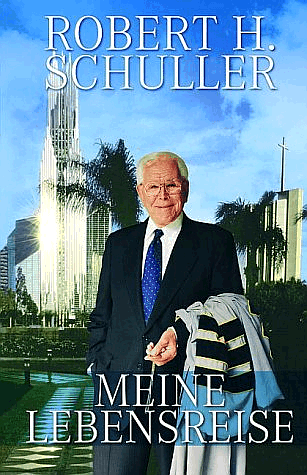
Abb.: Einbandtitel
{Wenn Sie HIER
klicken, können Sie dieses Buch bei amazon.de bestellen}
Webpräsenz: http://www.crystalcathedral.org/. -- Zugriff am 2005-04-18
"Schuller, Robert H(arold) (1926-)
Minister in the Reformed Church in America, televangelist, and purveyor of the gospel of positive thinking, Robert H. Schuller was born to a farm family in Alton, Iowa, and reared in the Reformed Church in America. He attended that denomination's school and seminary, Hope College and Western Theological Seminary, both in Holland, Michigan. Upon graduation from seminary in 1950, Schuller was ordained and accepted the pastorate of the Ivanhoe Reformed Church in Riverside, Illinois, whose membership increased tenfold during his four-and-a-half-year tenure.
The classis of California (the local jurisdiction of the Reformed Church in America) summoned Schuller west in 1955 to begin a congregation in Orange County. Schuller, always an innovator, rented the Orange Drive-In movie theater for Sunday worship services and, perched atop the refreshment stand, preached to the automobiles who had responded to his newspaper advertisements: "Come as you are, in the family car." In a culture crazed with the automobile, the idea caught on, and the Garden Grove Community Church quickly grew from one hundred to several thousand. Schuller constructed a church building just down the street from the drive-in, the first of several large building projects he has undertaken on that site, including the massive Crystal Cathedral, designed by Philip Johnson and completed in 1980.
Schuller's theology has been a hybrid of evangelicalism and a Dale Carnegie-type positive thinking philosophy, which Schuller appropriated from his mentor, Norman Vincent Peale. Schuller, both in his books and in his sermons, offers simple step-by-step outlines and tidy aphorisms, like, "Turn your hurt into your halo," "Tough times don't last; tough people do," and "Give yourself a spiritual shampoo." Schuller's writings over the years suggest that the language of therapy has overwhelmed the language of theology. One book, Self-Esteem: The New Reformation, even argued that the church should abandon theocentric language in favor of the language of pop psychology. Whatever its provenance, however, Schuller's theology has been enormously popular, purveyed through books and his Hour of Power television program, which began in 1970."
[Quelle: Balmer, Randall Herbert <1954 - >: Encyclopedia of evangelicalism. -- Rev. and expanded ed. -- Waco, TX : Baylor University Press, ©2004. -- viii, 781 S. ; 23 cm. -- ISBN: 193279204X. -- s.v. -- {Wenn Sie HIER klicken, können Sie dieses Buch bei amazon.de bestellen}]
Jetzt übernimmt der Sohn Robert Schullers, Robert Anthony, allmählich die Nachfolge.

Abb.: Ticket to Heaven der Hour of Power
[Bildquelle:
http://www.hourofpower.org/misc/ticket.html. -- Zugriff am 2005-04-18]
Die Hour of Power aus der Crystall Cathedral ist in Deutschland im Fernsehen zu sehen:
VOX So. 8:00
TBN Eutelsat Sa. 18:00
CNBC/NBC So. 12:00
Matthäusevangelium 10 34 Denkt nicht, ich sei gekommen, um Frieden auf die Erde zu bringen. Ich bin nicht gekommen, um Frieden zu bringen, sondern das Schwert.
35 Denn ich bin gekommen, um den Sohn mit seinem Vater zu entzweien und die Tochter mit ihrer Mutter und die Schwiegertochter mit ihrer Schwiegermutter;
36 und die Hausgenossen eines Menschen werden seine Feinde sein.
37 Wer Vater oder Mutter mehr liebt als mich, ist meiner nicht würdig, und wer Sohn oder Tochter mehr liebt als mich, ist meiner nicht würdig.
38 Und wer nicht sein Kreuz auf sich nimmt und mir nachfolgt, ist meiner nicht würdig.
39 Wer das Leben gewinnen will, wird es verlieren; wer aber das Leben um meinetwillen verliert, wird es gewinnen.[Einheitsübersetzung]
"The war which is going on in Vietnam today is but a narrow theater of a broader war between the free world and the communist world. The first thing that every believer should understand about the war which is now raging is that it is a holy war. By definition a holy war is a war in which the God of the universe is on one side, and against the other side. The issue in this war is nationalism . .. The Bible is explicit that God is the author of nationalism. [Genesis 10, 32: "These are the families of the sons of Noah, after their generations, in their nations: and by these were the nations divided in the earth after the flood. "]" Rev. Jerry Bryan: The Biblical doctrine of warfare [Predigt, 1972-05-14 (Muttertag)]
[Zitiert in: Mojtabai, A. G. (Ann Grace) <1937 - : Blessèd assurance : at home with the bomb in Amarillo, Texas. -- 1st Syracuse University Press ed. -- Syracuse, N.Y. : Syracuse University Press, 1997. -- xvi, 255 S. ; 21 cm. -- ISBN: 0815605080. -- Originally published: Boston : Houghton Mifflin, 1986. -- S. 135. -- {Wenn Sie HIER klicken, können Sie dieses Buch bei amazon.de bestellen}]
""The man whom I follow, howbeit stumblingly and poorly," Dr. Moore begins, "is called the Prince of Peace. He promised his followers peace. But it was not the kind of peace the world has to give." Jesus knew that "as long as sinful men control this earth, there would be need to take the sword. The Bible tells us from the beginning that, because of evil in man, God might will, or permit, the world's destruction. The Flood of Noah's day is an example of that destruction. In I Samuel we read of God's command to Saul to take an army and utterly annihilate the Amalekites. And as Isaiah tells us (2:4), it will be only in the time when there is no more sin that people shall beat their swords into plowshares and their spears into pruning hooks, that nation shall not lift up sword against nation, and neither learn war any more. We must be strong as a deterrent until the Prince of Peace returns and gives us peace.
Our Savior came to give His life as a ransom for many. He was rightly called a man of sorrows, and acquainted with grief. At the same time, I find no emotion in Jesus more pronounced than the emotion of hate. Not hate of people, but hate of hypocrisy, the intimidation and enslavement of other human beings, created in the image of God, by those who have the power to intimidate or enslave.""Dr. Winfred Moore, pastor First Baptist Church of Amarillo, Texas
[Zitiert in: Mojtabai, A. G. (Ann Grace) <1937 - : Blessèd assurance : at home with the bomb in Amarillo, Texas. -- 1st Syracuse University Press ed. -- Syracuse, N.Y. : Syracuse University Press, 1997. -- xvi, 255 S. ; 21 cm. -- ISBN: 0815605080. -- Originally published: Boston : Houghton Mifflin, 1986. -- S. 115f -- {Wenn Sie HIER klicken, können Sie dieses Buch bei amazon.de bestellen}]
"I think there is no way you can read the thirteenth chapter of Romans and be a pacifist," Moore asserts. "Our government was established by God for a purpose. Surely, the purpose cannot be according to Scripture or history to allow weakness and softness in the name of the religion of Jesus Christ to make us what ancient Rome became — effeminate, soft, lovers of luxury, so that when the barbarians came there was nothing with which to defend." [Der Brief an die Römer, Kapitel 13Der Christ und die staatliche Ordnung
1 Jeder leiste den Trägern der staatlichen Gewalt den schuldigen Gehorsam. Denn es gibt keine staatliche Gewalt, die nicht von Gott stammt; jede ist von Gott eingesetzt.
2 Wer sich daher der staatlichen Gewalt widersetzt, stellt sich gegen die Ordnung Gottes, und wer sich ihm entgegenstellt, wird dem Gericht verfallen.
3 Vor den Trägern der Macht hat sich nicht die gute, sondern die böse Tat zu fürchten; willst du also ohne Furcht vor der staatlichen Gewalt leben, dann tue das Gute, sodass du ihre Anerkennung findest.
4 Sie steht im Dienst Gottes und verlangt, dass du das Gute tust. Wenn du aber Böses tust, fürchte dich! Denn nicht ohne Grund trägt sie das Schwert. Sie steht im Dienst Gottes und vollstreckt das Urteil an dem, der Böses tut.
5 Deshalb ist es notwendig, Gehorsam zu leisten, nicht allein aus Furcht vor der Strafe, sondern vor allem um des Gewissens willen.
6 Das ist auch der Grund, weshalb ihr Steuern zahlt; denn in Gottes Auftrag handeln jene, die Steuern einzuziehen haben.
7 Gebt allen, was ihr ihnen schuldig seid, sei es Steuer oder Zoll, sei es Furcht oder Ehre.[Einheitsübersetzung]]
Dr. Winfred Moore, pastor First Baptist Church of Amarillo, Texas
[Zitiert in: Mojtabai, A. G. (Ann Grace) <1937 - : Blessèd assurance : at home with the bomb in Amarillo, Texas. -- 1st Syracuse University Press ed. -- Syracuse, N.Y. : Syracuse University Press, 1997. -- xvi, 255 S. ; 21 cm. -- ISBN: 0815605080. -- Originally published: Boston : Houghton Mifflin, 1986. -- S. 129 -- {Wenn Sie HIER klicken, können Sie dieses Buch bei amazon.de bestellen}]
Abb.: Gottes (?) Flugzeugträger USS Harry S. Truman im Persischen Golf, 2005
[Bildquelle: http://www.defendamerica.mil/archive/2005-01/20050126pm2.html. -- Zugriff am 2005-04-07]
"
Abb.: Gottes General: Jerry Boykin
[Bildquelle: http://inn.globalfreepress.com/modules/news/index.php?storytopic=0&start=550. -- Zugriff am 2005-04-07]"Baptism by Fire
Jerry Boykin's anti-Muslim remarks caused an immediate stir when NBC Nightly News and the Los Angeles Times first reported them in October 2003. But I first saw the complete videotape of his storied speech in late November, courtesy of former presidential candidate and Christian right leader Gary Bauer, whose organization, American Values, distributed copies for free in his defense."We are engaged not only in a war against radical Jihadists whose sole aim is our complete destruction," Bauer wrote in his cover letter, "but a cultural war over our traditional values and common sense. The political correctness being so unfairly directed at General Boykin while he wages a concerted effort to capture or kill both Osama bin Laden and Saddam Hussein is a classic example of how the convergence of these two battles can hurt our country."
The event documented on the tape was a "patriotic service" at the Good Shepard Community Church in Boring, Oregon, an annual event at which the congregation honors its members who are veterans or who are currently serving in the armed forces. The church choir kicked off the ceremony with a patriotic medley that folded in everything from "America the Beautiful" to "Auld Lang Syne"; men in uniform then filed onto the stage with their children and grandchildren, each planting a small flag in a giant bouquet of white carnations. Then came the star attraction, a man introduced as someone who "loves our nation, loves the Savior, and has been willing to risk his life to protect us." While the servicemen in the congregation attended in their dress uniforms, Boykin walked up to the stage in his battle fatigues, his pants tucked into polished combat boots. What surprised me most, viewing the grainy tape, was how scripted his speech seemed to be. His comments in print seemed so off-the-wall I assumed he had blurted them out spontaneously. But the general's talk was a multimedia affair, and his remarks on the tape seem well rehearsed, timed to coincide with the images in a lengthy slide show. He spends much of his talk telling war stories from his time in Mogadishu, Somalia (he figured in the Black Hawk Down events), and offering blow-by-blow battle details from the U.S. campaign in Afghanistan. Then he projects a series of graphic photographs from 9/11, followed by a shot of George W. Bush.
"Then this man stepped forward and he looked America in the eye and he said, 'We will not forget, we will not falter and we will not fail,'" Boykin said. "Now ask yourself this: why is this man in the White House? The majority of Americans did not vote for him. Why is he there? And I tell you this morning he's in the White House because God put him there for such a time as this. God put him there to lead not only this nation but to lead the world, in such a time as this."
"Such a time as this" is a phrase from the Bible, and it's a theme Boykin returns to again and again in his speech.
Then Boykin flashes slides of Osama bin Laden, Saddam Hussein, Kim Jong Il, and leaders of the Taliban, and asks each time,"Is this man the enemy? What about this man?" With a flourish, standing there in his combat fatigues, he offered his own answer: "The enemy is not a physical enemy. The enemy is none of these people that I showed you here. The enemy is a spiritual enemy. It's called the principality of darkness. We, ladies and gentlemen, are in a spiritual battle, not a physical battle. Oh, we've got soldiers fighting on the battlefields, we've got sailors, marines, airmen, coast guardsmen out there fighting against a physical enemy. But the battle this nation is in is a spiritual battle, it's a battle for our soul. And the enemy is a guy called Satan----Satan wants to destroy this nation. He wants to destroy us as a nation and he wants to destroy us as a Christian army. I'm here on a recruiting trip. I'm here asking you to join this army."
Near the end of his talk, he clicks to a slide from Iraq, but this image isn't a battle scene. It's a soldier kneeling, with his head bowed, getting baptized, what Boykin calls "one of the greatest photographs to come out of the war." The deputy undersecretary of defense closes with a prayer.
"We ask you Lord, in the name of Jesus, that if there is one among us here today that has never joined your army, that has never made the commitment to be part of your army, that in fact today will be the day of their salvation, Lord."
He's in uniform, everyone around him is in uniform, and on the day he delivers the address he's just been put in charge of critical U.S. military operations—at this point, Jesus' army and the U.S. Army have become one and the same.
"Religious extremism is all over the world," Hussein Ibish, spokesperson for the American Arab Anti-Discrimination Committee, said on Crossfire, after Boykin's remarks had made headlines. "We don't need it in the Defense Department." Editorial pages across the country called for Boykin to be put on inactive duty, while Senator John Warner, the Republican chairman of the Armed Services Committee, demanded a formal probe. Yet Boykin's civilian boss, Defense Secretary Donald Rumsfeld, praised the general's "outstanding record," and his military superior, Joint Chiefs chairman Richard Myers, would say only, "It doesn't look like any rules were broken." Rumsfeld eventually announced that the Pentagon inspector general would launch an investigation into Boykin's remarks, but insisted he was doing so only at Boykin's request. The same week the Boykin story broke, the president condemned anti-Jewish remarks by the prime minister of Malaysia as "reprehensible" and "divisive." But his response to Boykin recalled his earlier muted response to the anti-Muslim remarks of Falwell, Robertson, and Graham. The general he had just entrusted with the task of capturing Saddam and bin Laden had basically compared Islam to Satan, and Bush's response was this:"He doesn't reflect my point of view or the view of this administration."
After all, General Boykin was fast outpacing Alabama judge Roy Moore, the Ten Commandments hero, as the biggest cause celebre on the Christian right, and caution was in order. After Bush's slight attempt to distance himself from the general's remarks, Bauer sent an action alert to his members, writing,
"I must be missing something. The general has said that America is under attack because we are built on a Judeo-Christian values system; that ultimately the enemy is not flesh and blood, but rather the enemy is Satan; and that God's hand of protection prevented September 11 from being worse than it was... precisely which of those statements does the president take issue with?"
The Christian Coalition began a petition drive urging Rumsfeld not to buckle under to the "intolerant liberal mob [that] has castigated General Boykin, a true American hero." And Focus on the Family Chairman James Dobson took to the airwaves, calling Boykin "a martyr" and imploring listeners to call the White House. Nihad Awad, director of the Council on American-Islamic Relations, articulated the concerns of many when he charged that "putting a man with such extremist views in a critical policy-making position sends entirely the wrong message to a Muslim world that is already skeptical about America's motives and intentions." In this administration, the diplomatic risks of offending the Muslim world had proved a secondary concern when measured against the politicals risks of offending the administration's invaluable evangelical base."
[Quelle: Kaplan, Esther: With God on their side : how Christian fundamentalists trampled science, policy, and democracy in George W. Bush's White House. -- New York, NY [u.a.] : New Press, 2004. -- XII, 322 S. ; 20 cm. -- ISBN 1-565-84920-5. -- S. 20 - 23. -- {Wenn Sie HIER klicken, können Sie dieses Buch bei amazon.de bestellen}]
"War, Holy War. Despite the fact that many nations have used Scripture passages out of context to promote martial ventures, the Old Testament does not glorify or even recommend warfare as a solution to problems. Quite the opposite: Violence is thoroughly condemned.
Lamech and his song of vengeance is an aberration in the history of man (Gen. 4:23-24). The famous heroes of old, men of renown, are not presented in a context of approbation (Gen. 6:4). Violence that filled the earth with pain was one of the major causes of the flood (Gen. 6:11). Nim-rod, the mighty warrior and the first military aggressor (10:8-11), is not part of the redemptive line. The land of Nimrod is destined to be ruled by the sword (Mic. 5:6).
Simon and Levi lose their rights among the firstborn because their swords are weapons of violence. Although their massacre (Gen. 34) was for an allegedly moral purpose, it caused them to be scattered in Israel (49:5-7). When Moses killed an Egyptian to help an Israelite, he found that this method only delayed God's deliverance (Exod. 2:12).
David is associated with the successful expansion of his realm by warfare. He cannot, however, build God's temple because he has fought many wars and shed much blood in God's sight (1 Chron. 22:8). When David sought to carry out a census with a military purpose it very nearly cost him his kingdom (2 Sam. 24).
Wars in the Bible have been discouraged or even stopped by prophets. The prophet Shemaiah would not allow Rehoboam to put down the rebellion of the northern tribes by force of arms (1 Kings 12:22-23). Micaiah refused to be swayed by the unanimous clamor of the war prophets (1 Kings 22).
Israel's leaders are rebuked by the prophet Oded for bringing Judean prisoners of war into the country (2 Chron. 28:11). Judah's leaders are destined for wrath because they sought to expand their borders when Israel was weakened by Assyrian aggression in the north (Hos. 5:10). Their aggression is compared to unscrupulous landowners who move the boundary stones to increase the size of the property.
When war is inevitable, it must be carried out humanely. Nations are not allowed to go beyond the use of reasonable force necessary to achieve their objectives. In the first two chapters of Amos foreign nations are designed for judgment because of their war crimes both against Israelites and against each other. Jehu was authorized by Yahweh to end Ahab s dynasty, but his violence went far beyond his objectives. Thus the house of Jehu is to be punished for the massacre at Jezreel (Hos. 1:4).
The Torah contained rules to ensure wars would be conducted as humanely as possible. Female captives could not be violated. If a man saw a prisoner he wished to marry, her rights and feelings must be respected. She must be given time to mourn her family. If he later grew tired of her, he could not abuse her or sell her for money (Deut. 21:10-14). Before a city was attacked the law required that terms of peace be offered. If peace was accepted the city was not to be destroyed (Deut. 20:11). There were even conservation laws governing destruction of trees in a siege (Deut. 20:19-20).
In the Old Testament era wars were often made unnecessary by miraculous or unusual circumstances. Exodus 14 presents a standard paradigm of biblical deliverance. Moses proclaims to the people, "Stand firm and you will see the deliverance the Lord will bring you today." The Pharaoh's elite chariot corps is destroyed by the waters of the sea without the use of a single human weapon.
Troops besieging Elisha's house are smitten with blindness. The prophet leads them straight into Samaria. When their eyes are opened, the prophet will not allow the king to kill them. After they are fed, they are returned to their master (2 Kings 6:18-22). Later in 2 Kings 7:6 the Aramean armies retreat because Yahweh makes a loud noise. In Hezekiah's time, the Assyrian siege is ended by the angel of death (2 Kings 19:35).
In Jonah 3:8 the Ninevites are not faulted for their idolatry but because of their violence. God makes it clear in Jonah 4 that it is his interest to save lives, not to take them. While it is true that Yahweh will one day punish the godless nations with a sword, it will be in his own good time. It will not be because he is overwhelmed b\ the anger of the moment. God is not slack concerning his promises but is willing for all to come to repentance (2 Peter 3:9). In Zechariah 1:12-13 even the angel of the Lord loses patience at this slowness and must be comforted.
The hope of the future for the people of God is not in war and conquest. It is when nations stream to the holy mountain to learn about God. It will be a time when weapons are turned into farm implements and war shall be no more (Isa. 2:1-4).
Genocide in the Book of Joshua. The killing of everyone in Jericho and Ai, young and old, men and women in Joshua (6:21; 8:24-25) seems harsh and cruel when taken out of context. It must be remembered that this is a special circumstance carried out only during the initial conquering of the land. It is not a general rule to be applied in every armed conflict.
Israel is forbidden to make an alliance with Canaanites or to give any quarter to them (Exod. 23:32-33; 34:12-15). Yet in Abraham's day no one felt it was strange for the patriarch to have an alliance with Eshcol and Aner (Gen. 14:13). In 15:16 Abraham is told that the sin of the Amor-ites has not yet reached its full measure. Simon and Levi are rebuked for their slaughter of Canaanites at Shechem (Gen. 34; 49:5-7).
In Genesis 38 Judah leaves his brethren to stay with a Canaanite named Hirah who becomes his friend (w. 1, 12). Later both he and his son marry Canaanite girls. One of these girls becomes a direct descendant of Christ and the first woman mentioned in the New Testament (Matt. 1:3).
At the end of the period of judges David conquers Jerusalem. Yet he does not kill the Je-busites there or even take their land by force. Instead, he refuses the gift of Arunah, the Jebusite's threshing floor, choosing to pay him for it (2 Sam. 24:18-23). In the period of Solomon when all the Canaanite strongholds are under the authority of Israel, the Canaanites are not killed but are put to forced labor (1 Kings 9:20-21).
All this indicates that special circumstances were prevailing in the initial period of conquest. Leviticus 18 mentions the depraved state of Canaanite society at this time. Heinous sexual perversions were a part of their religion. Child sacrifice was also practiced. Verse 25 indicates that the land was so defiled that it vomited out its inhabitants. All these practices would not only have contaminated pure Mosaic Yahwehism but would have destroyed the fabric of any society's family structure.
Deuteronomy 20:16-18 indicates the Canaan-ites were to be killed that they may not "teach you to follow all the detestable things they do in worshiping their gods." It is a fact attested by archaeological finding that the immorality mentioned in Leviticus 18 was an integral part of Canaanite worship. One piece of literature depicts the head of the Canaanite pantheon bearing two children by a man's wives. The man is delighted they have been chosen for this purpose. Liturgical markings indicate it was used in worship. This story celebrates the birth of two Canaanite gods called Shachar and Shalim. It appears that the killing of these people was to be done at the outset so as to allow Mosaic morality to gain a foothold in the land.
Practices of Jezebel, Ahab's wife from Sidon, shows what happens when just one Canaanite occupies a place of authority. She attempts to kill all the prophets of the Lord (1 Kings 18:13). She has Naboth killed so Ahab can possess his vineyard. Ahab grew up in a society where the Ten Commandments were an important standard. Jezebel grew up in a context where she heard about a Canaanite goddess smashing a young man's skull because she wanted his bow.
Life is sacred in the Old Testament. Murder is a capital offense in the covenant of Genesis 9:1-7. Yet no physical life can be more important than God's redemptive purpose for the whole world. If Canaanites had been allowed to survive unbridled, they would have slowly and painfully killed their own selves.
It does not seem to have ever been God's purpose to slaughter all' the Canaanites at once. The Book of Joshua describes a few dramatic victories for a theological purpose. Exodus 23:29-30, however, indicates it was God's original purpose to drive the Canaanites out "little by little" so the land would not become desolate and wild animals multiply against them. Judges 3:1-4 informs us that Canaanites were left to test the Israelites and to keep them militarily alert. What is seen in Joshua is the rapid crushing of Canaanite capability of being an offensive threat. They were militarily crippled so there would be little chance for them to gain control of Israelite society.
Actually the Book of Joshua plays down the human element in warfare. Joshua categorically denied that the land of Canaan was won with their own sword and bow (Josh. 24:12). Moses before him had told the people that the nations would not be driven out because of Israel's righteousness but because of the wickedness of these nations (Deut. 9:4).
When the Israelites cross Jordan after a supernatural parting of the waters, Joshua seemingly proceeds to do everything a competent military commander should never do. He cripples his entire fighting force for two weeks by subjecting them to the painful act of circumcision (Josh. 5:2). When the army recovered, they celebrated the Passover (5:10). Thereafter Joshua learns he is, after all, not the commander of the forces and must take off his shoes before his superior heavenly leader (5:14).
Israelites have no engineering skills to use in capturing a walled city. Instead they proceed to walk around the city and will use only faith to bring the walls down. After only two cities (Jericho and Ai) are taken they proceed north into hostile territory to Shechem. Here they pause to perform a lengthy, time-consuming consecration service (Josh. 8:30-35).
The message of the Book of Joshua is that the land was not taken by brilliant military strategy, technologically advanced weaponry, or great heroism of mighty warriors. It was solely a supernatural act of the grace of God according to the promise. It was given by the promise and it will be kept by being faithful to the promises of God.
Holy War. The Old Testament speaks of the "wars of Yahweh" (Num. 21:14; 1 Sam. 18:17; 25:28), but does not use the term "holy war." This was introduced into the literature by the German scholar Friedrich Schwally in 1901. It refers to a type of warfare totally devoted to the plans and purposes of the Lord. God not only endorses and directs it but is an active participant.
The first example of this kind of warfare in the Hebrew Bible is found in Exodus 17:8-16. Here the Amalekites are the aggressors. It is learned from Deuteronomy 25:17-19 that they were attacking the stragglers at Israel's rear when they were faint and weary. Although knowledge of the destruction of Egyptians in the Red Sea was widespread, these treacherous people had no qualms about attacking God's people. Therefore, these attacks were an affront to the glory of God.
Moses took the rod of God to the top of a hill. When the rod was raised, Israel prevailed. When Moses put his hands down, Amalek prevailed. At the end of the day the battle was won by Israel because Aaron and Hur kept Moses' hands held high. Moses was commanded by the Lord to record these events on a scroll. Hereafter there would be perpetual warfare between Yahweh and Amalek until they were completely blotted out.
Because this is war devoted to the Lord, it was often preceded by sacrifices, prayer, and some type of religious liturgy. The leader would often remind the troops that Yahweh had already delivered the enemy into their hand and would himself be fighting next to them. In Deuteronomy 20 the priest was to do this (w. 1-4). In at least one battle the liturgy itself celebrating Yahweh's amazing grace was sufficient to bring about a decisive victory (2 Chron. 20:20-23).
It was not always apparent that the war was actually a holy war. Various means of determining Yahweh's stance in the coming battle were sought such as Urim, dreams, or prophets. If the Lord did not answer by any of these, it was considered to be an ominous foreboding (1 Sam. 28:5-7) and called for desperate measures. Kings were often very careful to determine if prophetic oracles endorsing the attack were genuine (cf. 1 Kings 22).
Because the war was a holy war, those who comprise the fighting force must also be holy. They were consecrated to the Lord (Josh. 3:5). This would often require extensive inspection and preparations. Everyone was expected to be ritually clean. Even the camp itself must be holy. The Lord must not see anything indecent among them (Deut. 23:9-14). Even the weapons themselves would sometimes be consecrated to the Lord (1 Sam. 21:5; 2 Sam. 1:21).
The mental and emotional state of the army was important. Anyone who was fainthearted and did not put his full trust in Yahweh was sent home. Anyone who might have his mind too much on affairs back home was dismissed (Deut. 20:1-8).
Sometimes kings would attempt to write their own rules of holy war. A case in point would be Saul's requirement that no one could eat until the enemy was completely destroyed (1 Sam. 14:24). Sometimes a battle would be won by bypassing ritual and prescribed routine. Jonathan and his armor bearer spontaneously attacked and routed a seemingly impregnable Philistine garrison in this way (1 Sam. 14:1-23).
These examples indicate that God is not to be manipulated into giving victory because a certain set "recipe" was followed. Hophni and Phineas made the fatal mistake of assuming victory would be guaranteed by bringing a sacred cult object into the camp, namely, the ark of Yahweh (1 Sam. 4). Later Jeremiah's temple sermon denounced the theology that assumed Jerusalem was inviolable because of the presence of the temple there (Jer. 7:8-15).
In 1 Samuel 13 and 15 Saul felt that the ritual sacrifice was more import than listening to God's word (15:22-23). Only faithfulness to the Torah and loyal obedience to Yahweh would insure victory. If the Torah is strictly followed it is promised that the enemy will come out one way and flee seven ways (Deut. 28:1, 7). Wisdom literature observed that "when a man's ways are pleasing to the Lord, he makes even his enemies live at peace with him" (Prov. 16:7).
The high point and conclusion to the battle was the dedication of the booty to the Lord. In total, all out holy war this was completely devoted to the sacred treasury (Josh. 6:18-19). Personal appropriation of things under the ban would cause serious consequences. Achan's transgression caused defeat at Ai (Josh. 7-8). Saul's keeping back some of the spoil caused him to lose the kingdom (1 Sam. 15:23).
David's Wars of Expansion. Early in his career David's military successes incited the wrath of Saul. Women sang of him that he had killed his ten thousands (1 Sam. 18:7) while Saul was only given credit for his thousands. His first success over the giant Goliath was because he came not trusting in weapons but in the name of the Lord (17:45). Early in his life he had learned that simple faith in the Lord gave him victory over the lion and the bear. He brought this way of thinking to his first actual military situation. His viewpoint, which made the difference, was that Israel's forces were actually the army of the living God and thus should be invincible (17:36).
Psalm 60, traditionally considered to be Davidic, affirms that the help of man is worthless. "With God," David says, "we will gain the victory, and he will trample down our enemies." He believed that God raises a victory banner for those who fear him. In faith he could proclaim, "Moab is my washbasin, upon Edom I toss my sandal" (w. 4-12.
In 2 Samuel 22 David avers that Yahweh is the sum total of his strategic military potential (w. 1-3). Through the eyes of faith he saw his victory being brought about by the march of the Divine Warrior in the attendant circumstances of storm and earthquake (w. 8-16). With God's help he believes he is personally capable of astounding feats (v. 30). It is from Yahweh he has learned all his military expertise (v. 35). Only by God's grace has victory been achieved.
No king ever experienced David's victorious results. In direct contrast are Jeroboam II's hollow victory celebrations vaunting victory by his own hand (Amos 6:13-14). David's small empire became a model, illustration, and pattern for the coming triumph of the ideal messianic king who will rule from sea to sea (Zech. 9:9-10). He will rule the nations with a rod of iron (Ps. 2:8-9).
Amos 9:11-15 foretells of the restoration of David's fallen tent. The early New Testament church considered the conversion of the Gentiles as at least a partial fulfillment of this prophecy (Acts 15:15-18). David's empire was never a biblical ideal toward which temporal kings were to strive. Such conquests would only be realized in the messianic era.
Warfare in Wisdom Literature. For waging war guidance is needed; many advisors will bring victory (Prov. 20:18; 24:6). A small city with few people in it can be saved by the wisdom of a poor man (Eccles. 9:14-15). This advice is echoed in the teaching of Christ in Luke 14:31-32. A king who wages war against another must count the cost. So a disciple who follows Christ in the way of the cross must also count his cost.
Secular warfare is risky business. Even with superior resources victory is never assured because time and chance happen to all (Eccles. 9:11). There is, however, safety against capricious fate. The name of the Lord is a strong tower where the righteous can be safe (Prov. 18:10).
One can have many war horses but in the end the battle is the Lord's (Prov. 21:31; Isa. 31:1).
Some weapons are more lethal than military hardware. The teeth of the wicked are like knives and swords (Prov. 30:14). There are those who use their tongue like the thrusts of a sword (Prov. 30:14). James 3:5-6 says that the tongue can set the whole world on fire. There are some tasks more difficult than capturing enemy cities. Controlling your own spirit and winning back an offended brother are examples (Prov. 16:32; 25:28).
Wisdom, power, and warfare are interconnected in Isaiah 51:9-10 with the exodus. In the Wisdom of Solomon, an apocryphal book, wisdom, the Logos, the all-powerful Word, is a fierce warrior. He leaps from heaven's royal throne with a sharp sword to slay the firstborn in Egypt (18:14-16). Following this concept of wisdom and the word, the New Testament identifies the sword of the Spirit as the Word of God (Eph. 6:18). The same theme is found in Hebrews 4:13-14. Here the Word is like a sharp sword penetrating the thoughts and attitudes of the heart.
Eschatological Warfare. Prophets foretold that in the days to come Israel would be given special powers over their enemies. With horns of iron and hoofs of bronze they will break to pieces many nations (Mic. 4:13). The sons of Zion will become like a warrior's sword against the sons of Greece (Zech. 9:13). Sheep of the flock will one day be made like proud war horses (10:3). These predictions are set in a postexilic scenario. Possibly second century B.C. successes of the Maccabees and even recent triumphs of Israeli forces in modern history are partial fulfillments of these events.
Many of the prophets foretold overconfident, empty hopes of nations who felt that Jerusalem would be an easy conquest (Isa. 29:7-8; Ezek. 38-39; Zech. 12-14). Such unrealistic expectations are compared by Isaiah to a hungry man who dreams he is at a banquet. Just when defeat seems assured the Divine Warrior will appear on behalf of his people (Isa. 63:1-5; Rev. 19:11-21).
In this final conflict the battle is conspicuous by its absence. There is no fight! Dramatically the two forces come together. Where one would expect to see the onset of hostilities, there is the simple narrative statement that the enemy leadership is seized. Summarily, with no fanfare, they are simply thrown into the lake of fire (Rev. 19:20). Rank and file are systematically killed with the sword that comes from the mouth of the lone horseman (v. 21).
Warfare in the New Testament. Christ's triumphal entry into Jerusalem celebrated his past and future defeat of the powers of darkness. He fulfills the prophecy of Zechariah 9:9 of the gentle king riding on a donkey (Matt. 21:5). People cry7 out portions of Psalm 118, saying, "Blessed is he who comes in the name of the Lord" (Mark 11:9-10). Psalm 118 is regarded by many Old Testament scholars as a celebration of a king returning from a military victory.
In Psalm 118:12 the king states his enemies surrounded him like bees. In the name of the Lord he cuts them off. Shouts of victory go up in the tents of the righteous (w. 12-15). Christ had recently defeated demons (Mark 9) and death (John 11). He had told his disciples he saw Satan fall like lightening from heaven (Luke 10:18).
Upon his triumphal entry the divine warrior goes straight to his temple and cleanses it (Matt. 21:12) of the money makers (Mai. 3:1-4). His subsequent death and resurrection were described by apostle Paul as a military victory over the powers of darkness. He disarmed the powers and authorities. He made a public spectacle of them, triumphing over them by the cross (Col. 2:15). Thereupon victorious, as the conquering king in Psalm 68:18, he ascended on high, he led captives in his train, and he gave gifts to men (Eph. 4:8).
Just before his death Christ foresaw the awful tragedy of the revolts against the Romans and wept over the city (Luke 19:41-44). On the way to the cross he told the women not to weep for him but for themselves and for their children who would be caught up in this awful pogram (Luke 23:27-30). In the Olivet Discourse he warned his disciples to flee when they saw Jerusalem encompassed about with armies (Luke 21:20-24).
His warning of false messiahs coming in his name was probably fulfilled in part by Bar Kosiba, who in a.d. 132 styled himself as "son of the star" (Bar Kochbah). Even the great rabbi Akivah believed he was the messiah. These revolts initiated the trampling of Jerusalem by the Gentiles (Luke 21:8, 24). He foretold that wars and rumors of wars would be commonplace throughout the age (21:9-11).
All this proves to be a model and an illustration of the endtime conflict of the people of God. Christ did not believe the end would come in his day. He believed these things would be the beginning of sorrows (Matt. 24:8). One who reads the Olivet Discourse is like a person watching the landscape and seeing two mountain ranges. They appear to be close together when in fact they may be miles apart.
Destruction of Jerusalem by the Romans of the first century is the close mountains. Far off in the distance is another, high cluster of peaks. This is the final war at the end of the age, which will be attended by a great deal of supernatural phenomena (Luke 21:25-28). It is this endtime generation that will not pass away until all is fulfilled (Matt. 24:34).
The horrors of the final conflict are introduced in the Book of Revelation by four eerie horsemen (6:1-8). The first phase of war is quick, easy conflict with the bow, a long-range weapon. Then comes wholesale slaughter with the red horse.
The black horse introduces famine and rationing. The final horse brings ravaging death to the home front by starvation, disease, and wild animals. These are only the beginning of sorrows.
The arch criminal called the "antichrist" will even have power to wage war against the saints and overcome them (Rev. 13:7; cf. Dan. 7:21-25). The sudden arrival of the Ancient of Days will, however, abruptly terminate his activities. At that time the saints of the most high will be given sovereignty and dominion over the earth (Dan. 7:26-27.
In the meantime the Christian life is metaphorically compared to warfare. Timothy is exhorted to endure hardship as a good soldier of Jesus Christ (2 Tim. 2:3). He is encouraged to fight the good fight of faith and hold on to eternal life (1 Tim. 6:12). This conflict, however, is not against flesh and blood but against the powers of this dark world, against spiritual forces in heavenly realms (Eph. 6:12). Paul warns the Eph-esians to put on the whole armor of God into this conflict (6:10-15).
The church at Corinth was told that the weapons we fight with are not the weapons of this world. They have divine power to demolish strongholds. These strategic assets can take into captivity every thought to the obedience of Christ (2 Cor. 10:1-5)."[Quelle: Paul Ferguson. -- In: Evangelical dictionary of biblical theology / edited by Walter A. Elwell. -- Grand Rapids, Mich. : Baker Books ; Carlisle, Cumbria : Paternoster Press, ©1996. -- x, 933 S. ; 26 cm. -- ISBN: 0801020492. -- s.v. -- {Wenn Sie HIER klicken, können Sie dieses Buch bei amazon.de bestellen}]
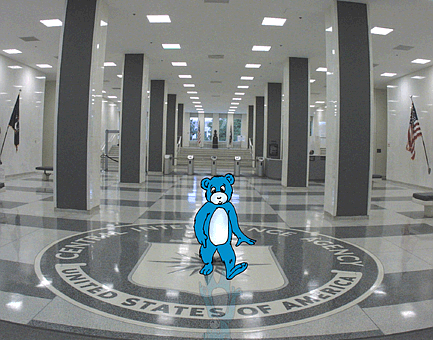
Abb.: So bringt man den CIA Kindern näher: Ginger in der Lobby der CIA
[Bildquelle:
http://www.cia.gov/cia/ciakids/ginger/scene10.html. -- Zugriff am
2005-04-14]
Im Zweifelsfall steht der Gott der Fundamentalisten immer auf der Seite amerikanischer Geheimdienste, wenn sie ihr schmutziges Geschäft im Ausland verrichten, z.B. in Zentralamerika:
"While researching my new book Roads to Dominion, I came across a set of documents at the Hoover Institution from the Reagan administration's Outreach Working Group on Central America. On a regular basis, more than fifty groups met secretly with White House personnel to coordinate media and lobbying activities on behalf of the Nicaraguan Contras. The Working Group included:
- Jerry Falwell's Moral Majority,
- Pat Robertson's Freedom Council,
- Maranatha Campus Ministries,
- the Heritage Foundation,
- Conservative Caucus,
- Accuracy in Media,
- Young Americans for Freedom;
- the neoconservative Institute on Religion and Democracy,
- the Ethics and Public Policy Center,
- the Jewish Institute for National Security Affairs and
- the Anti-Defamation League of B'nai B'rith.
The meetings were conducted by officials from the National Security Council, the CIA, the Defense and State Departments.
In a real conspiracy, the Christian Right, the ADL, the New Right and the neoconservatives worked together with U.S. intelligence agencies to promote murder and mayhem in Central America. Most of the same players rallied together again when the agenda was to bomb Iraq back to the Stone Age."[Quelle: Diamond, Sara: Facing the wrath : confronting the Right in dangerous times. -- Monroe, Me. : Common Courage Press, ©1996. -- 236 p. ; 20 cm. -- ISBN 1567510787. -- S. 208f.]
Zu Kapitel 8: Ausblick